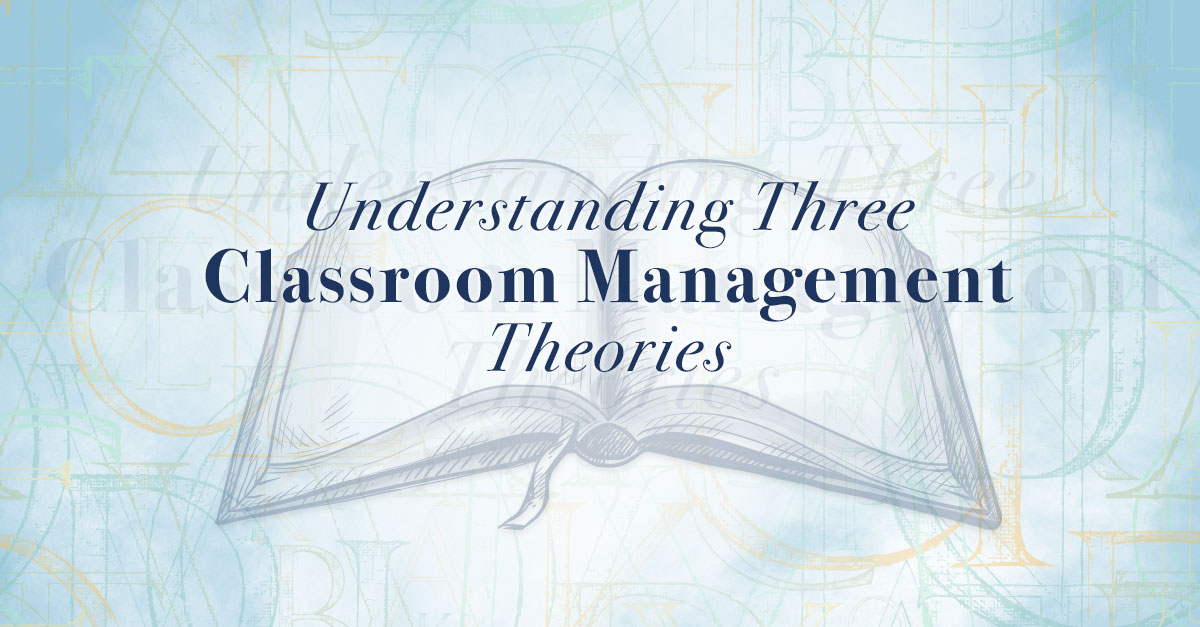Understanding Three Key Classroom Management Theories

By Tricia Hussung
How teachers manage their classrooms is an important part of achieving an effective learning environment. Educators know that all students learn differently, and choosing the right instructional style can mitigate behavioral issues and make good instruction possible. According to the National Comprehensive Center for Teacher Quality, a significant body of research also demonstrates that classroom organization and the ability to effectively manage student behavior “significantly influence the persistence of new teachers in teaching careers.” Within this context, it is clear that instructional theory and classroom management strategies are among the most important aspects of teacher education.
While classroom management theory is constantly evolving, there are three key theorists who stand out when it comes to modern education. Throughout the 20th and 21st centuries, experts like B.F. Skinner, William Glasser and Alfie Kohn revolutionized the ways that teachers deliver education. Understanding their theories can help educators define their own classroom management methods and make decisions about how to best approach interactions with students.

B.F. Skinner’s contribution to learning theory can’t be overstated. His work is based upon the idea that learning is a function of change in overt behavior. According to Skinner, changes in behavior are a result of individuals’ responses to events, or stimuli, that occur in their environment. When a stimulus-response (S-R) pattern is rewarded, the individual is conditioned to respond similarly in the future. The key to Skinner’s theory is reinforcement, or anything that strengthens the desired response. This could include praise, good grades, a reward or even a feeling of accomplishment. Of course, negative reinforcement occurs when a stimulus results in increased response when it is withdrawn. The central tenet of Skinner’s work is that positively reinforced behavior will reoccur. This is why information is presented in small amounts. Responses can be reinforced, and reinforcement will be applied to similar stimuli.
Skinner’s work in operant conditioning has been integrated into both classroom management and instructional development. When applied to programmed instruction, the following should occur:
- Practice should occur in a question-answer format that exposes students to information gradually through a series of steps.
- The learner should respond each time and receive immediate feedback.
- Good performance should be paired with secondary reinforcers like praise, prizes and good grades.
- Instructors should try to arrange questions by difficulty so the response is always correct, creating positive enforcement.
There are many obvious ways that Skinner’s work has been directly incorporated into modern school systems. Though rewards were utilized for good behavior long before Skinner, many behavior management systems utilized in today’s classrooms are influenced by his theories. Teachers utilize immediate praise, feedback or rewards when seeking to change problematic student behavior, and some even use “token economies” to reward students in a systematic way.

William Glasser coined the term “choice theory” in 1998. In general, this theory states that all we do is behave. Glasser suggests that almost all behavior is chosen, and we are driven by genetics to satisfy five basic needs: survival, love and belonging, power, freedom and fun. In choice theory, the most important need is love and belonging because connectedness with others is required as a basis in satisfying all other needs. The classroom should therefore be a needs-satisfying place for students.
Glasser’s work impacts learning theory in a variety of ways. It has been utilized in schools across the globe and has changed the ways that teachers deliver instruction.
First, Glasser identifies teachers as managers who need to work effectively if they want to successfully teach their students. The role of teachers as managers requires them to guide students in understanding that working hard and being obedient is worth it and will have a positive influence on their lives. Teachers can achieve this through developing positive relationships with students and creating active, relevant learning experiences that enable students to demonstrate mastery and success.
When it comes to developing lessons, teachers who practice choice theory work to make sure that student classroom activities are designed to satisfy the students’ needs. This allows learning to increase while diminishing disruption. Students are able to “connect, feel a sense of competence and power, have some freedom, and enjoy themselves in a safe, secure environment,” according to Funderstanding. There are three common characteristics of classrooms and schools that apply choice theory:
- Coercion is minimized because it never inspires quality. Students aren’t “made” to behave using rewards and punishments. Instead, teachers build positive relationships with their students and manage them.
- Teachers focus on quality. They expect mastery of concepts and encourage students to redo their work and try again until they have demonstrated competence and high-quality work. The emphasis is on deep learning through application.
- Self-evaluation is common. Students are provided with helpful information and take ownership of their learning by evaluating their own performance. This promotes responsibility and helps students reach goals while becoming skilled decision-makers who are actively involved in their own education.

Alfie Kohn’s work critiques many aspects of traditional education, namely the use of competition or external factors as motivation. Kohn maintains that societies based on extrinsic motivation always become inefficient over time. He questions the hierarchical structures at work in mainstream education. Positions of authority are “unnaturally scarce,” and such systems assume that all people have a competitive nature. He argues that positive enforcement only encourages students to seek out more positive enforcement, rather than truly learn. Kohn believes that the ideal classroom emphasizes curiosity and cooperation above all, and that the student’s curiosity should determine what is taught. Because of this, he argues that standards should be kept very minimal and is critical of standardized testing. Kohn also argues that a strict curriculum and homework are counterintuitive to student needs. When it comes to classroom management, Kohn believes that most teachers rely too heavily on extrinsic motivation rather than more intrinsic factors. He suggests teachers keep cooperation in mind because when curiosity is nurtured, rewards and punishments aren’t necessary.
To implement Kohn’s approaches in the classroom, teachers can allow students to explore the topics that interest them most. Students “should be able to think and write and explore without worrying about how good they are,” he suggests. In general, Kohn believes that there is too much emphasis on achievement rather than the learning process. He emphasizes that not all students learn at the same pace, and standards do not take this into account. In general, Kohn believes in classrooms where the student is at the center of everything. Ideally, such a classroom would feature:
- Multiple activity centers with various classroom structures for group work
- Displays of student projects
- Students exchanging ideas
- A respectful teacher mingling with students
- Students excited about learning and actively asking questions
- Multiple activities occurring at the same time
In terms of modern school systems, Kohn’s approaches are more consistent with those used in elementary classrooms. The key element is a “shift from a quiet, well-managed classroom to one that is lively and features an emphasis on student learning,” explains Thomas Hanson on OpenEducation.net.

When educators are able to focus on classroom organization as a means of behavior management, they achieve better results for students. If you are interested in education topics like this, consider the online Master of Education from Husson University. Graduate-level education is ideal for teachers looking to advance their career and become leaders in the classroom and beyond. In addition, this degree program is ideal for individuals interested in becoming curriculum/instructional specialists, corporate trainers, course designers, education policy developers or adjunct faculty members.
Regardless of your professional focus, Husson’s program helps educators develop successful learning techniques through an inquiry-based approach. You can learn more about this fully online program here.






